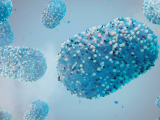A new study of GeoSentinel Network data involving 226 monkeypox cases from 15 countries shows that, of 219 patients for whom data were available, 216 (99%) reported sexual or close intimate contact in the 21 days before symptom onset.
The study is published in The Lancet Infectious Diseases and adds to a growing body of literature that shows the monkeypox outbreak is primarily fueled by sexual contact.
Other important findings show that men who have sex with men (99% of all male patients) reported a median of three recent sexual partners, and clinical manifestations of the virus differed by HIV status, but HIV status did not correlate with more severe disease outcomes.
Monkeypox patients who were HIV-positive were more likely to report diarrhea, anal rash and lesions, and a higher rash burden.
Data were collected from May 1 to Jul 1, 2022, across 71 clinical sites in 29 countries. The median age of patients was 37 years, and 44% were HIV-positive. Overall, 30 (13%) of 226 patients were admitted to hospital; 16 (53%) of whom had severe illness, defined as hospital admission for clinical care rather than infection control, the authors said.
Mass gatherings linked to transmission
A significant proportion of patients reported attending large mass gatherings before developing monkeypox symptoms. Of 161 patients with available information, 37 (23%) met their sexual partners at such gatherings, including the Maspalomas Festival on Spain's Gran Canaria island, and various other Pride-related festivities in Europe and the United States, the authors said.
Thirty percent of patients said they developed lesions or rash as a first symptom.
"All but three patients reported sexual or close intimate contact in the 21 days before symptom onset, and most reported multiple sexual partners, with a median of three partners," the authors concluded. "Some patients met sexual partners at mass gatherings, possibly contributing to amplification of monkeypox virus transmission, and 16% had a concurrent STI," referring to sexually transmitted infections.
Though previous monkeypox outbreaks have demonstrated the virus can be passed via sexual contact, that mode of transmission is the dominant force behind the current outbreak, the authors said.
In a commentary on the study, two researchers from the UK Health Security Agency write that the outbreak should inspire clinical curiosity, as many patients report fewer lesions than in past outbreaks, and the sexual transmission component is relatively new.
"The outbreak has confounded what was previously known (or thought to be known) about the epidemiology, transmission, and clinical features of monkeypox. This outbreak, and early experience from the SARS-CoV-2 pandemic, illustrates why narrow case definitions and restricted access to testing might impede public health responses," they write.
FDA authorizes Abbott test
The Food and Drug Administration has issued an emergency use authorization for Abbott's monkeypox test, which will offer real-time polymerase chain reaction (PCR) test results for clinicians. The test relies on swabs of lesions. This is the first commercial test to be authorized for monkeypox detection.
The US Centers for Disease Control and Prevention on Oct 7 reported 172 more monkeypox cases, raising the national total to 26,557.
The global total stands at more than 60,000 cases in 105 countries.






















